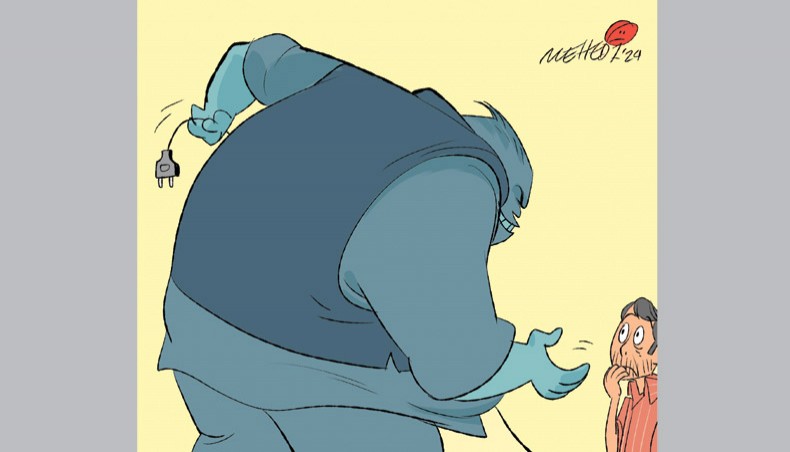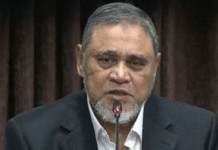
In an executive order on Tuesday, the government increased the price of gas used in power production and captive power by 75 paisa, or up to 5 per cent with an announcement of increasing the power price by 70 paisa next month.
The new gas price will take effect in February, said a gazette notification, announcing that power producers will have to pay Tk 14.75 for a unit of gas, while captive power producers will pay Tk 30.75 for a unit of gas following the order.
The double price hikes came as a blow to consumers who were bracing for a hot, prolonged summer when hours of daily power outages were feared.
The price hikes are also reminiscent of the crippling inflation triggered by power and gas price hikes between January and March last year, eventually forcing millions to leave protein off their plates.
The price of power increased three times in the past year, and the price of gas increased once.
Hours before the gas price hike order was published, the state minister for power and energy, Nasrul Hamid, told journalists that the hike was needed by the government to stop paying subsidy in the power sector.
A press release issued by the power and energy ministry over the gas price hike said that the hike would reduce the requirement to pay subsidy in 2023–24 from Tk 6570.54 crore to Tk 6,000 crore.
The BPDB proposed to increase the power price by 81 per cent this year to stop paying subsidy in the power and energy sector.
The government is also under obligation to reduce its subsidy burden, particularly for the $4.7 billion loan being released by the International Monetary Fund.
‘People are paying more and more for energy in a corrupt, inefficient system that could never reduce the burden of deficit or subsidy,’ said Consumers Association of Bangladesh energy adviser M Shamsul Alam.
‘The government continued to pass on the burden of its wrong energy policy and mismanagement onto the shoulders of people,’ he said.
With the latest hike, the gas price has been hiked 11 times at retail and bulk levels since 2008, often citing the need to import liquefied natural gas or reduce subsidy.
The power price, on the other hand, was increased more than a dozen times, citing the same reasons, increasing the price by about threefold since 2010–11.
The increases never resulted in the reduction of subsidy or the loss of the Bangladesh Power Development Board.
The BPDB’s annual loss rather quadrupled in the 2022–23 financial year, compared with the year before, mainly because of a dramatic increase in capacity charge and fuel costs.
The BPDB’s annual loss stood at Tk 11,765 crore as the capacity charge soared to Tk 17,156 crore in 2023, with forecasts of the cost going up in the coming years with the introduction of more fossil-fuel-based power plants.
The government has so far paid over Tk 100,000 crore in capacity charge.
Ever since coming to power in 2009, the incumbent government has increased installed power generation capacity by more than fivefold, mostly based on imported fossil fuels.
The increase in installed power capacity was always unsolicited, protected by an indemnity law.
The expansion became a burden for people as half of the installed capacity of 26,000MW remained idle, generating a huge capacity charge.
‘The price hikes would not have been a big deal had it ensured uninterrupted energy supply,’ Mahbubul Alam, president of the Federation of Bangladesh Chambers of Commerce and Industry, said.
Uninterrupted gas supply is still a far cry in the industry, as industries get far less pressure than they paid for in their piped gas supply.
The power supply is also not uninterrupted, and outages occur almost every day of the year because of the government’s inability to buy energy and technical glitches.
The existence of captive power, which refers to the power generation capacity owned by industries, is a testament to the unreliable national grid.
The captive power capacity is 2,800MW.
‘The price hikes will increase production costs,’ said Mahbub.
CAB’s Shamsul Alam warned that the price hikes would inflate living costs, leaving people hard-pressed to further cut their expenses.
‘What the government thinks will increase its income will actually end up lowering it,’ he said.
Though the price of gas in six other categories, including household, fertiliser, the tea industry, and compressed natural gas, was not increased, the price hike for gas used in power generation would indirectly affect everyone.
Experts said that people’s suffering would barely achieve anything, for they would not generate the dollars that the government needed to boost its import capacity to come out of the energy and power crises.
This was the fifth time energy prices were hiked since the government curtailed the authority of the Bangladesh Energy Regulatory Commission Act in December 2022 to increase energy prices in executive order, bypassing a public hearing.
In 2019, the CAB estimated that checking inefficiencies and corruption could save Tk 10,549 crore in the power sector.
The Technical Evaluation Committee of the Bangladesh Energy Regulatory Commission revealed in a March 2022 public hearing that state-owned Petrobangla pocketed Tk 2,538 crore by importing 553 mmcfd less LNG than promised in the financial years 2019–20 and 2020–21.
‘The government has never walked in the direction that could have reduced energy prices, sparing people the need to pay more,’ said Shamsul Alam.
‘This is an injustice,’ he said.
New Age









